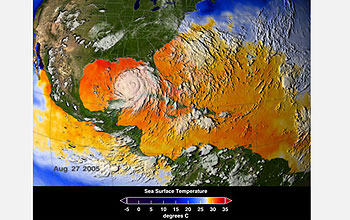Media Advisory 05-020
NSF Announces "Rapid Response" Awards to Learn the Lessons of Katrina
September 28, 2005
This material is available primarily for archival purposes. Telephone numbers or other contact information may be out of date; please see current contact information at media contacts.
The National Science Foundation (NSF) has announced the first of several dozen grants to send research teams into the Gulf Coast regions devastated by Hurricane Katrina. These "rapid-response" teams will seek to draw as many lessons as possible from the disaster before evidence is lost and memories can fade. For example:
- A group led by Raymond Seed of the University of California, Berkeley, will do an engineering analysis of why New Orleans' levee system failed;
- A group led by Robert Cook of Louisiana State University will analyze the complex mix of organic matter dissolved in New Orleans flood waters;
- A group led by Vishal Shah of Dowling College, New York will test a new chemical method for decontaminating flood waters;
- A group led by Bimal Paul of Kansas State University will study what factors led people to comply or not comply with mandatory orders to evacuate the area in advance of the hurricane.
NSF expects to announce more such awards over the next few weeks. An up-to-date list can be found here.
All these awards are being made under NSF's Small Grants for Exploratory Research (SGER) program. Although this program was created to support small-scale, exploratory, high-risk research of all kinds, it has proved to be especially well-suited for rapid-response situations because SGER requests can be processed and approved more quickly than ordinary research proposals. Indeed, NSF has previously used it to field research teams in the aftermath of both the 9/11 terrorist attacks and the 2004 Indian Ocean tsunami.
As comparatively quick as the SGERs are, however, the researchers in this program will be joining other NSF-supported investigators who have been in the field for some time.
At the University of Colorado, Boulder, for example, the National Hazards Center has funding from NSF and several other federal agencies to give grants to teams of social and behavioral science researchers, who stand ready to head into the field at a moment's notice whenever a disaster strikes. The teams deployed in response to Hurricane Katrina under this program are listed here: http://www.colorado.edu/hazards/qr/katrina.html.
At the same time, many NSF-supported researchers have sent groups to the Gulf Coast using their existing grant money—or in some cases, using supplemental funds provided by NSF. An example is the Earthquake Engineering Research Center at SUNY-Buffalo (http://mceer.buffalo.edu), which sent reconnaissance teams to study structural damage and societal response in the aftermath of Katrina.
NSF's research efforts in the hurricane-affected area are continuing to expand. For a complete and up-to-date listing, please check the online fact sheet.
-NSF-
Media Contacts
M. Mitchell Waldrop, NSF, (703) 292-7752, email: mwaldrop@nsf.gov
Program Contacts
Dennis Wenger, NSF, (703) 292-7014, email: dwenger@nsf.gov
Related Websites
The National Hazards Center: http://www.colorado.edu/hazards/
A current list of Katrina-related SGER awards: http://tinyurl.com/79tsd
A fact sheet on NSF's response to Katrina: http://www.nsf.gov/news/news_summ.jsp?cntn_id=104474&org=NSF&from=news
The U.S. National Science Foundation propels the nation forward by advancing fundamental research in all fields of science and engineering. NSF supports research and people by providing facilities, instruments and funding to support their ingenuity and sustain the U.S. as a global leader in research and innovation. With a fiscal year 2023 budget of $9.5 billion, NSF funds reach all 50 states through grants to nearly 2,000 colleges, universities and institutions. Each year, NSF receives more than 40,000 competitive proposals and makes about 11,000 new awards. Those awards include support for cooperative research with industry, Arctic and Antarctic research and operations, and U.S. participation in international scientific efforts.
Connect with us online
NSF website: nsf.gov
NSF News: nsf.gov/news
For News Media: nsf.gov/news/newsroom
Statistics: nsf.gov/statistics/
Awards database: nsf.gov/awardsearch/
Follow us on social
Twitter: twitter.com/NSF
Facebook: facebook.com/US.NSF
Instagram: instagram.com/nsfgov



